Student Profiles
Interested in hearing more about the experiences of Environmental Studies students themselves? Read through our student profiles to learn what students study, the interests they develop, and why ENVS at Tufts was a great choice for them.
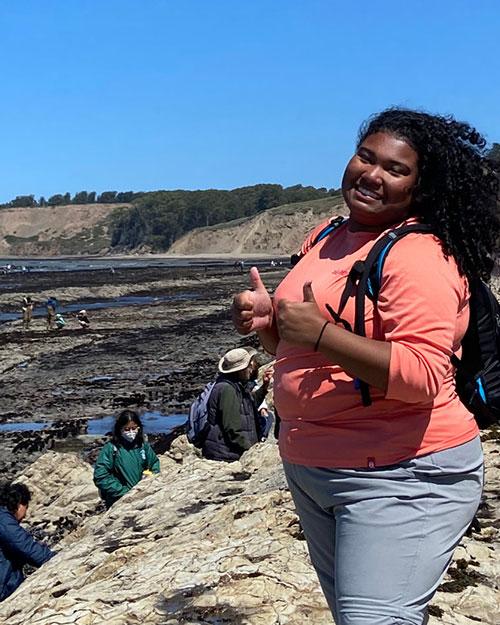
Kailani Day
Class: 2025
Majors: Anthropology and Environmental Studies (Track II: Sustainability, Policy, and Equity)
Why ENVS? I really leaned into the interdisciplinary nature of the Environmental Studies co-major and decided I wanted to know more about the links between culture and relationship to nature. That is what led me to majoring in Anthropology as well. Through the combination of these two majors, I have been able to bring new perspectives to my classes and engage with the material in an exciting way. I have been able to gain a new appreciation for environmental studies even though I have been interested in majoring in this field since middle school!
What led you to choose your ENVS Track? I am in the Sustainability, Policy, and Equity track which has allowed me to think about the ways I want to change the impacts of climate change we are currently experiencing. Because of my passion for environmental justice work, I wanted to focus on the ways that policy can be used as a tool to support marginalized communities. In classes such as Climate Change Policy and Anthropology in the Environment I have been able to reflect deeply on and discuss with peers the historical failures of governments and how we can change the narrative to create a brighter future for all. I plan on using this track to learn more about the ways I can help communities directly by working with community organizations and local government to advocate for residents that might not otherwise be heard!
What was your ENVS internship experience like? I love my internship with the U.S. Environmental Protection Agency! I collaborate with the Office of Research and Development, EPA Regional Office 9, and EPIC-N on a community resilience project entitled "Visualizing Cumulative Impacts". Much of my work involves researching cities across the country that are experiencing environmental racism and climate injustice. My larger goal is to plan a workshop to hear local governments' accounts about their climate adaptation plans and what support they may need to make those goals a reality. I learned a lot about how to engage with communities that need help due to climate change and what can be done to support them through a federal agency!
Do you have any advice for incoming ENVS students? Be open to exploring the different facets of environmental studies! The program is designed so that you can learn about various parts of the discipline all while focusing on a track of your choice. Do not be afraid to learn about a subject you have never heard of or take a class about a really specific topic! Use this time to learn more about what makes you excited for the future!
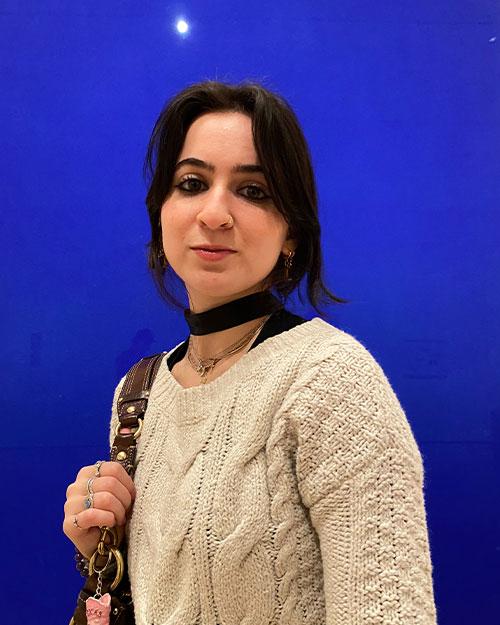
Marisa McCarthy
Class: 2024
Majors: Studio Art and Environmental Studies (Track V: Environmental Humanities)
Why ENVS? As a student in the Tufts/SMFA Combined Degree program, I chose the environmental studies major because it allowed me to pursue my environmental interests while also informing my artistic practice. Much of my art deals with environmental themes, and my environmental studies work is constantly inspiring me.
What led you to choose this ENVS Track? I chose the environmental humanities track because of my passion for environmental justice. This track allows me to focus on the humanitarian aspects of environmental work and dig deeper into the structural inequities in place which cause environmental injustices.
What is your favorite class you have taken in ENVS? My favorite class I’ve taken was Thinking With Plants. This was an ethnobotany class taught by anthropology professor Tatiana Chudakova. My favorite part was learning about the complex gender dynamics in plants.
Do you have any advice for incoming ENVS students? Don’t be afraid to take classes that cross over with other departments- these have been some of my favorite and most interesting courses.
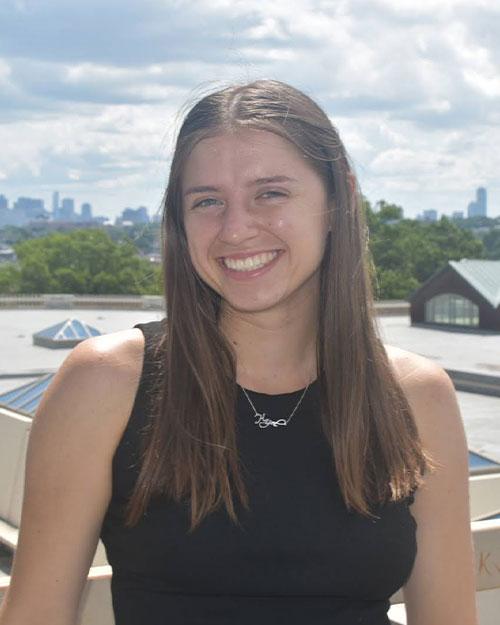
Hazel Ostrowski
Class: 2023
Majors: Sociology and Environmental Studies (Track III: Environmental Communication)
What led you to choose this ENVS Track? I originally planned to do Track II and focus my studies on environmental policy. However, in my time at Tufts I also worked social media-related jobs with the Tufts OCL and undergraduate orientation. Through this work, I became passionate about social media and communications, and took the opportunity to apply those skills to my environmental studies major. I was especially interested in the Track III electives and communications practice courses: I have taken Food Ethics, Sustainability in Action, Intro to GIS, and the Art of Civic Communication.
What is your favorite class you have taken in ENVS? Why is it your favorite and/or what's the coolest thing you learned? Either Intro to Environmental Fieldwork or Environmental Communication & Culture with Professor Stein. In the former, we learned the science behind tapping maple trees and even got to harvest some of our own maple syrup. In the latter, I worked on one of my favorite projects I have done at Tufts, about gentrification in the area around Tufts and how it relates to the environment.
What was your internship experience like? Last spring, I worked at the Tufts Office of Sustainability as an Events, Outreach, and Programs Intern. In this position, I helped assist with the OOS's sustainable move-out efforts. I created signage to promote sustainable move-outs, conducted outreach with local vendors, and helped manage a cohort of on-call student workers to manage our on-campus donation stations. In the end, we diverted over 21,000 pounds of waste and usable items from landfills, and it was a super rewarding experience!
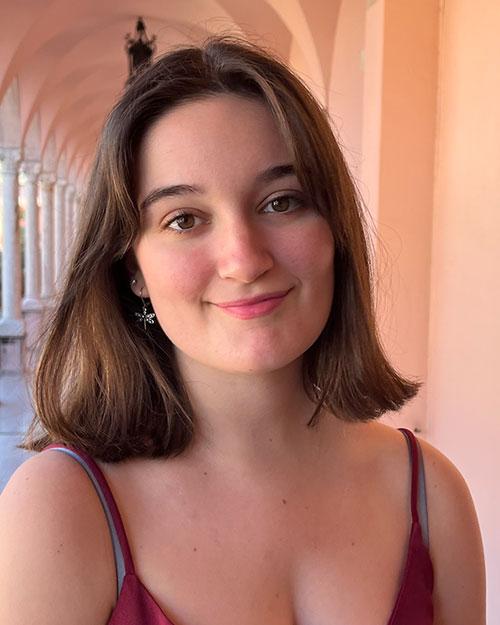
Chloe Markovits
Class: 2023
Majors: Biology and Environmental Studies (Track I: Environmental Science)
Why ENVS? I was interested in pursuing conservation and felt that the ENVS major would equip me with the language necessary to communicate and distill what I was learning in my Biology major (it has done exactly that!)
Do you have advice for incoming ENVS students? Find your niche! This advice was given to me by a horticulturalist during my ENV99 internship and has helped me tremendously. Preserving the natural world, while a noble cause, can be incredibly overwhelming, so it's important to specialize on more focused issues. Depth can be more powerful than breadth!
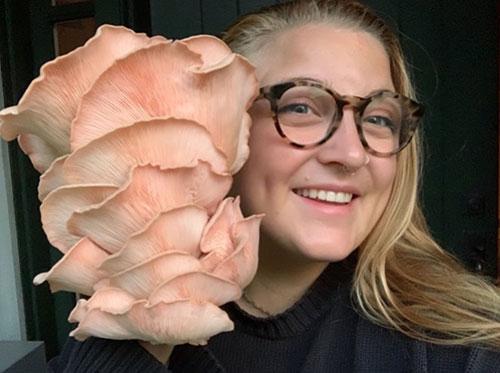
Muriel Horvath
Class: 2022
Majors: Environmental Studies and Studio Art
ENVS Experience: This winter, I began a long-term project titled Decomposition Dance as part of the Health Safety and Sustainability award. I am growing, sculpting, and painting mycelium and using culinary fungus with the intent to create outdoor installations in collaboration with ecosystems. So, all my materials are biodegradable! The project's experiments are centered around five chronological phases: creation, growth, response, conversation/play, and independence. The resulting forms are records of communication between the fungus and me. I have long been a lover of fungi and the wood-wide web, and I am thrilled to have the opportunity to incorporate these materials into my artistic practice.
Favorite ENVS course: My favorite ENVS related course so far was The Greening of Art: Ecology, Sustainability, and Sculpture Since 1970. It expanded my understanding of environmental art and challenged my preconceived notions about how someone could study the environment.
Advice for other ENVS majors: My advice would be to take as many ENVS related courses in other departments as are available and offered. Environmental studies is a far-reaching field and can be studied from all angles. There is always something new to learn and a new perspective or medium to see it from.